formerly eScholarship Editions


|
|
|
|
Your request for similar items found 20 book(s). | Modify Search | Displaying 1 - 20 of 20 book(s) | |
| 1. | 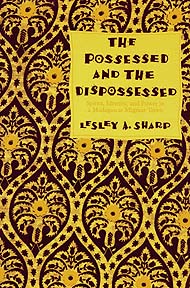 | Title: The possessed and the dispossessed: spirits, identity, and power in a Madagascar migrant town Author: Sharp, Lesley Alexandra Published: University of California Press, 1994 Subjects: Anthropology | African Studies | Medical Anthropology | Women's Studies | Indigenous Religions Publisher's Description: This finely drawn portrait of a complex, polycultural urban community in Madagascar emphasizes the role of spirit medium healers, a group heretofore seen as having little power. These women, Leslie Sharp argues, are far from powerless among the peasants and migrant laborers who work the land in this plantation economy. In fact, Sharp's wide-ranging analysis shows that tromba , or spirit possession, is central to understanding the complex identities of insiders and outsiders in this community, which draws people from all over the island and abroad.Sharp's study also reveals the contradictions between indigenous healing and Western-derived Protestant healing and psychiatry. Particular attention to the significance of migrant women's and children's experiences in a context of seeking relief from personal and social ills gives Sharp's investigation importance for gender studies as well as for studies in medical anthropology, Africa and Madagascar, the politics of culture, and religion and ritual. [brief] Similar Items |
| 2. | 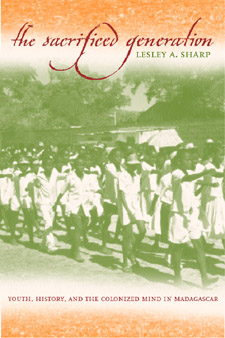 | Title: The sacrificed generation: youth, history, and the colonized mind in Madagascar Author: Sharp, Lesley Alexandra Published: University of California Press, 2002 Subjects: Anthropology | African History | Postcolonial Studies | Geography Publisher's Description: Youth and identity politics figure prominently in this provocative study of personal and collective memory in Madagascar. A deeply nuanced ethnography of historical consciousness, it challenges many cross-cultural investigations of youth, for its key actors are not adults but schoolchildren. Lesley Sharp refutes dominant assumptions that African children are the helpless victims of postcolonial crises, incapable of organized, sustained collective thought or action. She insists instead on the political agency of Malagasy youth who, as they decipher their current predicament, offer potent, historicized critiques of colonial violence, nationalist resistance, foreign mass media, and schoolyard survival. Sharp asserts that autobiography and national history are inextricably linked and therefore must be read in tandem, a process that exposes how political consciousness is forged in the classroom, within the home, and on the street in Madagascar. Keywords: Critical pedagogy [brief] Similar Items |
| 3. |  | Title: Urban forms and colonial confrontations: Algiers under French rule Author: Çelik, Zeynep Published: University of California Press, 1997 Subjects: Architecture | Middle Eastern Studies | Middle Eastern History | French Studies | Postcolonial Studies Publisher's Description: During its long history as the French colonial city par excellence , Algiers was the site of recurrent conflicts between colonizer and colonized. Through architecture and urban forms confrontations were crystallized, cultural identities were defined, and social engineering programs were shaped and challenged. In this pathbreaking book, Zeynep Çelik reads the city of Algiers as the site of social, political, and cultural conflicts during the 132 years of French occupation and argues that architecture and urban forms are integral components of the colonial discourse.Algiers' city planning, based on what Çelik calls "the trial-and-error" model of French colonial urbanism, included the fragmentation of the casbah, ambitious Beaux Arts schemes to create European forms of housing, master plans inspired by high modernism, and comprehensive regional plans. Eventually a dramatic housing shortage led all planning efforts to be centered on the construction of large-scale residential enclaves. French architects based their designs for domestic space on the concept of the "traditional house," itself an interdisciplinary colonial concept intertwined with the discourse on Algerian women. Housing also offered the French colonizers a powerful presence in a country where periodic resistance to the occupation eventually culminated in a seven-year war of liberation and an end to French rule.Extensively illustrated with photographs, maps, and housing plans, Çelik's book presents a fascinating example of colonial urban planning. Algiers comes alive as a city that reflected all the conflicts of colonialism while embracing innovation. [brief] Similar Items |
| 4. | 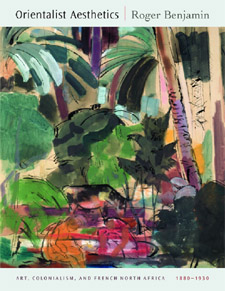 | Title: Orientalist aesthetics: art, colonialism, and French North Africa, 1880-1930 Author: Benjamin, Roger 1957- Published: University of California Press, 2003 Subjects: Art | Art History | French Studies Publisher's Description: Lavishly illustrated with exotic images ranging from Renoir's forgotten Algerian oeuvre to the abstract vision of Matisse's Morocco and beyond, this book is the first history of Orientalist art during the period of high modernism. Roger Benjamin, drawing on a decade of research in untapped archives, introduces many unfamiliar paintings, posters, miniatures, and panoramas and discovers an art movement closely bound to French colonial expansion. Orientalist Aesthetics approaches the visual culture of exoticism by ranging across the decorative arts, colonial museums, traveling scholarships, and art criticism in the Salons of Paris and Algiers. Benjamin's rediscovery of the important Society of French Orientalist Painters provides a critical context for understanding a lush body of work, including that of indigenous Algerian artists never before discussed in English. The painter-critic Eugène Fromentin tackled the unfamiliar atmospheric conditions of the desert, Etienne Dinet sought a more truthful mode of ethnographic painting by converting to Islam, and Mohammed Racim melded the Persian miniature with Western perspective. Benjamin considers armchair Orientalists concocting dreams from studio bric-à-brac, naturalists who spent years living in the oases of the Sahara, and Fauve and Cubist travelers who transposed the discoveries of the Parisian Salons to create decors of indigenous figures and tropical plants. The network that linked these artists with writers and museum curators was influenced by a complex web of tourism, rapid travel across the Mediterranean, and the march of modernity into a colonized culture. Orientalist Aesthetics shows how colonial policy affected aesthetics, how Europeans visualized cultural difference, and how indigenous artists in turn manipulated Western visual languages. [brief] Similar Items |
| 5. | 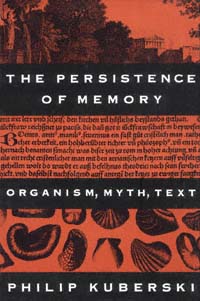 | Title: The persistence of memory: organism, myth, text Author: Kuberski, Philip Published: University of California Press, 1992 Subjects: Literature | History and Philosophy of Science Publisher's Description: While memory is one of the most fascinating faculties of consciousness, it is also one of the most mysterious. Is it memory - our own marvelous personal computer or data base - that brings us the intense feelings prompted by a certain object or situation?Drawing on an expansive array of sources, from microbiology to cosmology, Ovid to Proust, Egyptology to the cinema, Philip Kuberski leads us on a brave and beguiling exploration of memory. He enables us to see it as a worldly process in which individuals both remember and are remembered, all in a network of associations that join our bodies, personal and cultural myths, and aesthetic and literary experiences. His essays will provide a tantalizing and thoughtful read for those interested in literature, psychology, biology, anthropology, and philosophy. [brief] Similar Items |
| 6. | 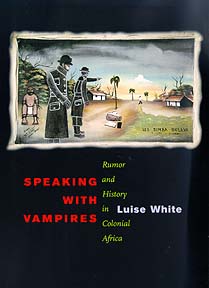 | Title: Speaking with vampires: rumor and history in colonial Africa Author: White, Luise Published: University of California Press, 2000 Subjects: African Studies | African History | African Studies | Cultural Anthropology Publisher's Description: During the colonial period, Africans told each other terrifying rumors that Africans who worked for white colonists captured unwary residents and took their blood. In colonial Tanganyika, for example, Africans were said to be captured by these agents of colonialism and hung upside down, their throats cut so their blood drained into huge buckets. In Kampala, the police were said to abduct Africans and keep them in pits, where their blood was sucked. Luise White presents and interprets vampire stories from East and Central Africa as a way of understanding the world as the storytellers did. Using gossip and rumor as historical sources in their own right, she assesses the place of such evidence, oral and written, in historical reconstruction. White conducted more than 130 interviews for this book and did research in Kenya, Uganda, and Zambia. In addition to presenting powerful, vivid stories that Africans told to describe colonial power, the book presents an original epistemological inquiry into the nature of historical truth and memory, and into their relationship to the writing of history. [brief] Similar Items |
| 7. |  | Title: Tangled memories: the Vietnam War, the AIDS epidemic, and the politics of remembering Author: Sturken, Marita 1957- Published: University of California Press, 1997 Subjects: American Studies | Sociology | Art | Media Studies | Popular Culture Publisher's Description: Analyzing the ways U.S. culture has been formed and transformed in the 80s and 90s by its response to the Vietnam War and the AIDS epidemic, Marita Sturken argues that each has disrupted our conventional notions of community, nation, consensus, and "American culture." She examines the relationship of camera images to the production of cultural memory, the mixing of fantasy and reenactment in memory, the role of trauma and survivors in creating cultural comfort, and how discourses of healing can smooth over the tensions of political events.Sturken's discussion encompasses a brilliant comparison of the Vietnam Veterans Memorial and the AIDS Quilt; her profound reading of the Memorial as a national wailing wall - one whose emphasis on the veterans and war dead has allowed the discourse of heroes, sacrifice, and honor to resurface at the same time that it is an implicit condemnation of war - is particularly compelling. The book also includes discussions of the Kennedy assassination, the Persian Gulf War, the Challenger explosion, and the Rodney King beating. While debunking the image of the United States as a culture of amnesia, Sturken also shows how remembering itself is a form of forgetting, and how exclusion is a vital part of memory formation. [brief] Similar Items |
| 8. | 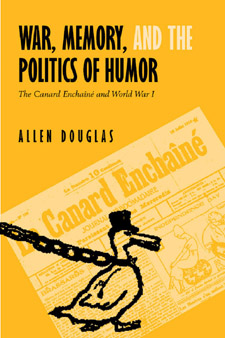 | Title: War, memory, and the politics of humor: the Canard enchaîné and World War I Author: Douglas, Allen 1949- Published: University of California Press, 2002 Subjects: History | French Studies | European History | European Literature | Print Media Publisher's Description: War, Memory, and the Politics of Humor features carnage and cannibalism, gender and cross-dressing, drunks and heroes, militarism and memory, all set against the background of World War I France. Allen Douglas shows how a new satiric weekly, the Canard Enchaîné, exploited these topics and others to become one of France's most influential voices of reaction to the Great War. The Canard, still published today, is France's leading satiric newspaper and the most successful periodical of the twentieth century, and Douglas colorfully illuminates the mechanisms of its unique style. Following the Canard from its birth in 1915 to the eve of the Great Depression, the narrative reveals a heady mix of word play, word games, and cartoons. Over the years the journal--generally leftist, specifically antimilitarist and anti-imperialist--aimed its shots in all directions, using some stereotypes the twenty-first century might find unacceptable. But Douglas calls its humor an affirmation of life, and as such the most effective antidote to war. [brief] Similar Items |
| 9. |  | Title: Imperial bedlam: institutions of madness in colonial southwest Nigeria Author: Sadowsky, Jonathan Hal Published: University of California Press, 1999 Subjects: African Studies | Psychology | African History | Medicine | Social Problems Publisher's Description: The colonial government of southern Nigeria began to use asylums to confine the allegedly insane in 1906. These asylums were administered by the British but confined Africans. Yet, as even many in the government recognized, insanity is a condition that shows cultural variation. Who decided the inmates were insane and how? This sophisticated historical study pursues these questions as it examines fascinating source material - writings by African patients in these institutions and the reports of officials, doctors, and others - to discuss the meaning of madness in Nigeria, the development of colonial psychiatry, and the connections between them. Jonathan Sadowsky's well-argued, concise study provides important new insights into the designation of madness across cultural and political frontiers. Imperial Bedlam follows the development of insane asylums from their origins in the nineteenth century to innovative treatment programs developed by Nigerian physicians during the transition to independence. Special attention is given to the writings of those considered "lunatics," a perspective relatively neglected in previous studies of psychiatric institutions in Africa and most other parts of the world. Imperial Bedlam shows how contradictions inherent in colonialism were articulated in both asylum policy and psychiatric theory. It argues that the processes of confinement, the labeling of insanity, and the symptoms of those so labeled reflected not only cultural difference but also political divides embedded in the colonial situation. Imperial Bedlam thus emphasizes not only the cultural background to madness but also its political and experiential dimensions. [brief] Similar Items |
| 10. | 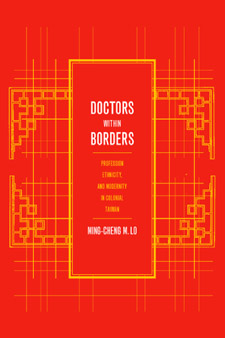 | Title: Doctors within borders: profession, ethnicity, and modernity in colonial Taiwan Author: Lo, Ming-cheng Miriam Published: University of California Press, 2002 Subjects: Asian Studies | Medical Anthropology | China | Asian History | Sociology Publisher's Description: This book explores Japan's "scientific colonialism" through a careful study of the changing roles of Taiwanese doctors under Japanese colonial rule. By integrating individual stories based on interviews and archival materials with discussions of political and social theories, Ming-cheng Lo unearths . . . [more] Similar Items |
| 11. | 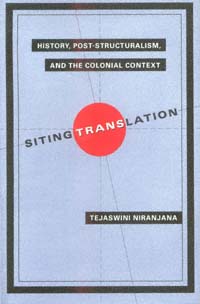 | Title: Siting translation: history, post-structuralism, and the colonial context Author: Niranjana, Tejaswini 1958- Published: University of California Press, 1992 Subjects: Postcolonial Studies | Literary Theory and Criticism | Southeast Asia | Cultural Anthropology Publisher's Description: The act of translation, Tejaswini Niranjana maintains, is a political action. Niranjana draws on Benjamin, Derrida, and de Man to show that translation has long been a site for perpetuating the unequal power relations among peoples, races, and languages. The traditional view of translation underwritten by Western philosophy helped colonialism to construct the exotic "other" as unchanging and outside history, and thus easier both to appropriate and control.Scholars, administrators, and missionaries in colonial India translated the colonized people's literature in order to extend the bounds of empire. Examining translations of Indian texts from the eighteenth century to the present, Niranjana urges post-colonial peoples to reconceive translation as a site for resistance and transformation. [brief] Similar Items |
| 12. | 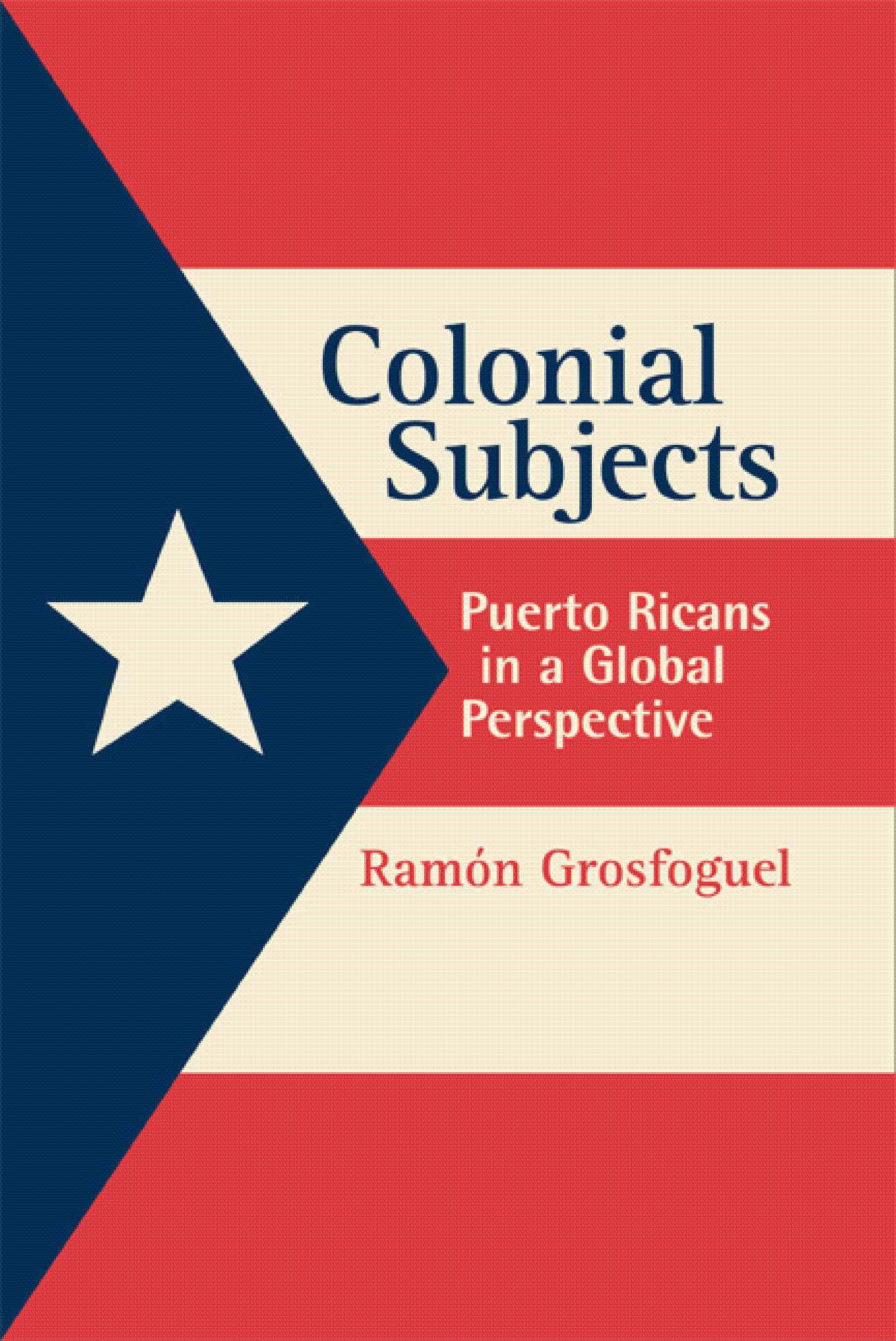 | Title: Colonial subjects: Puerto Ricans in a global perspective Author: Grosfoguel, Ramón Published: University of California Press, 2003 Subjects: Sociology | American Studies | Anthropology | Ethnic Studies | Latin American History | Postcolonial Studies | Urban Studies | Immigration | Urban Studies | Urban Studies Publisher's Description: Colonial Subjects is the first book to use a combination of world-system and postcolonial approaches to compare Puerto Rican migration with Caribbean migration to both the United States and Western Europe. Ramón Grosfoguel provides an alternative reading of the world-system approach to Puerto Rico's history, political economy, and urbanization processes. He offers a comprehensive and well-reasoned framework for understanding the position of Puerto Rico in the Caribbean, the position of Puerto Ricans in the United States, and the position of colonial migrants compared to noncolonial migrants in the world system. [brief] Similar Items |
| 13. | 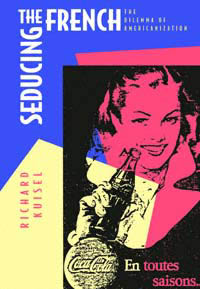 | Title: Seducing the French: the dilemma of Americanization Author: Kuisel, Richard F Published: University of California Press, 1993 Subjects: History | European History | Popular Culture | French Studies Publisher's Description: When Coca-Cola was introduced in France in the late 1940s, the country's most prestigious newspaper warned that Coke threatened France's cultural landscape. This is one of the examples cited in Richard Kuisel's engaging exploration of France's response to American influence after World War II. In analyzing early French resistance and then the gradual adaptation to all things American that evolved by the mid-1980s, he offers an intriguing study of national identity and the protection of cultural boundaries.The French have historically struggled against Americanization in order to safeguard "Frenchness." What would happen to the French way of life if gaining American prosperity brought vulgar materialism and social conformity? A clash between American consumerism and French civilisation seemed inevitable.Cold War anti-Communism, the Marshall Plan, the Coca-Cola controversy, and de Gaulle's efforts to curb American investment illustrate ways that anti-Americanization was played out. Kuisel also raises issues that extend beyond France, including the economic, social, and cultural effects of the Americanized consumer society that have become a global phenomenon.Kuisel's lively account reaches across French society to include politicians, businessmen, trade unionists, Parisian intelligentsia, and ordinary citizens. The result reveals much about the French - and about Americans. As Euro Disney welcomes travellers to its Parisian fantasyland, and with French recently declared the official language of France (to defend it from the encroachments of English), Kuisel's book is especially relevant. [brief] Similar Items |
| 14. | 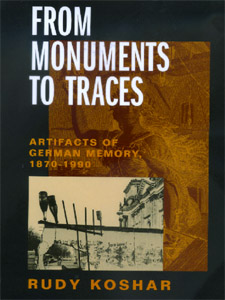 | Title: From monuments to traces: artifacts of German memory, 1870-1990 Author: Koshar, Rudy Published: University of California Press, 2000 Subjects: German Studies | History | Architectural History | European History Publisher's Description: Rudy Koshar constructs a powerful framework in which to examine the subject of German collective memory, which for more than a half century has been shaped by the experience of Nazism, World War II, and the Holocaust. Finding the assumptions of many writers and scholars shortsighted, Koshar surveys the evidence of postwar German memory in the context of previous traditions. From Monuments to Traces follows the evolution of German "memory landscapes" all the way from national unification in 1870-71 through the world wars and political division to reunification in 1990. The memory landscapes of any society may incorporate monuments, historical buildings, memorials and cemeteries, battlefields, streets, or natural environments that foster shared memories of important events or personalities. They may also be designed to divert public attention from embarrassing or traumatic histories. Koshar argues that in Germany, memory landscapes have taken shape according to four separate paradigms--the national monument, the ruin, the reconstruction, and the trace--which he analyzes in relation to the changing political agendas that have guided them over time. Despite the massive ruptures of Germany's history, we see that significant continuities have served to counterbalance the traumas of the German past. [brief] Similar Items |
| 15. |  | Title: Jewish memories Author: Valensi, Lucette Published: University of California Press, 1991 Subjects: Jewish Studies | Postcolonial Studies Publisher's Description: Collective memory: a living, breathing gift from the past, less fragmentary than the recollections of any one individual, more personal by far than "history." The authors of Jewish Memories saw in the large numbers of Jews who migrated to France during the twentieth century the chance to retrieve a past that might otherwise be lost forever. Through dozens of interviews, they listened to men and women talking of their lives and the places they came from, and found an almost uncanny resonance of individual voices with one another. Individual memories became part of a shared memory, projecting major themes of the Jewish tradition - exile and the sense of loss, the duty to remember, and the transmission of Jewish experience to the next generations.Hélène H. tells of dropping the all-important family teakettle during a terrified race to escape skirmishing soldiers. Charles H. talks about the innocent love he shared with a non-Jewish girl who studied with him. Anna D. describes her wordless reunion with her wounded husband after World War II. From communities now disappeared, scenes of home and family life, occupations, happy times and holidays reinforce one another, and we can feel the painful nostalgia for a kind of existence no longer possible.Two distinct but parallel sets of memories run through the narrative, that of Sephardi and that of Ashkenazi Jews, all of whom found their way to France. They arrived from Tunisia, Turkey, Poland, and Russia, from poor and well-to-do families, almost always driven from their homes by difficult circumstances, often with their most recent memories filled with horror and tragedy. The desire to remember it all and to pass it on to others who will also remember shines from every page, and makes this book as memorable for general readers as it is valuable for anthropologists, sociologists, and historians. [brief] Similar Items |
| 16. | 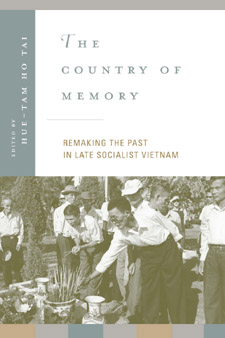 | Title: The country of memory: remaking the past in late socialist Vietnam Author: Tai, Hue-Tam Ho 1948- Published: University of California Press, 2001 Subjects: History | Southeast Asia | Film | Gender Studies | Postcolonial Studies | Popular Culture | Asian History Publisher's Description: The American experience in the Vietnam War has been the subject of a vast body of scholarly work, yet surprisingly little has been written about how the war is remembered by Vietnamese themselves. The Country of Memory fills this gap in the literature by addressing the subject of history, memory, and commemoration of the Vietnam War in modern day Vietnam. This pathbreaking volume details the nuances, sources, and contradictions in both official and private memory of the War, providing a provocative assessment of social and cultural change in Vietnam since the 1980s. Inspired by the experiences of Vietnamese veterans, artists, authorities, and ordinary peasants, these essays examine a society undergoing a rapid and traumatic shift in politics and economic structure. Each chapter considers specific aspects of Vietnamese culture and society, such as art history, commemorative rituals and literature, gender, and tourism. The contributors call attention to not only the social milieu in which the work of memory takes place, but also the historical context in which different representations of the past are constructed. Drawing from a variety of sources, such as prison memoirs, commemorative shrines, funerary rituals, tourist sites and brochures, advertisements, and films, the authors piece together the disparate representations of the past in Vietnam. With these rare perspectives, The Country of Memory makes an important contribution to debates within postcolonial studies, as well as to the literature on memory, Vietnam, and the Vietnam War. [brief] Similar Items |
| 17. | 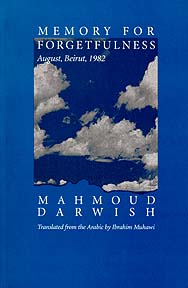 | Title: Memory for forgetfulness: August, Beirut, 1982 Author: Darwīsh, Maḥmūd Published: University of California Press, 1995 Subjects: Literature | Literature in Translation | Middle Eastern Studies | Rhetoric Publisher's Description: One of the Arab world's greatest living poets uses the 1982 Israeli invasion of Lebanon and the shelling of Beirut as the setting for this sequence of prose poems. Mahmoud Darwish vividly recreates the sights and sounds of a city under terrible siege. As fighter jets scream overhead, he explores the war-ravaged streets of Beirut on August 6th (Hiroshima Day). Memory for Forgetfulness is an extended reflection on the invasion and its political and historical dimensions. It is also a journey into personal and collective memory. What is the meaning of exile? What is the role of the writer in time of war? What is the relationship of writing (memory) to history (forgetfulness)? In raising these questions, Darwish implicitly connects writing, homeland, meaning, and resistance in an ironic, condensed work that combines wit with rage.Ibrahim Muhawi's translation beautifully renders Darwish's testament to the heroism of a people under siege, and to Palestinian creativity and continuity. [brief] Similar Items |
| 18. | 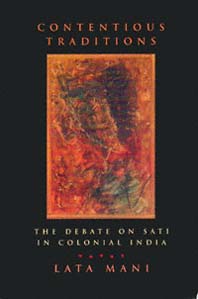 | Title: Contentious traditions: the debate on Sati in colonial India Author: Mani, Lata 1956- Published: University of California Press, 1998 Subjects: History | South Asia | Postcolonial Studies Publisher's Description: Contentious Traditions analyzes the debate on sati , or widow burning, in colonial India. Though the prohibition of widow burning in 1829 was heralded as a key step forward for women's emancipation in modern India, Lata Mani argues that the women who were burned were marginal to the debate and that the controversy was over definitions of Hindu tradition, the place of ritual in religious worship, the civilizing missions of colonialism and evangelism, and the proper role of the colonial state. Mani radically revises colonialist as well as nationalist historiography on the social reform of women's status in the colonial period and clarifies the complex and contradictory character of missionary writings on India.The history of widow burning is one of paradox. While the chief players in the debate argued over the religious basis of sati and the fine points of scriptural interpretation, the testimonials of women at the funeral pyres consistently addressed the material hardships and societal expectations attached to widowhood. And although historiography has traditionally emphasized the colonial horror of sati , a fascinated ambivalence toward the practice suffused official discussions. The debate normalized the violence of sati and supported the misconception that it was a voluntary act of wifely devotion.Mani brilliantly illustrates how situated feminism and discourse analysis compel a rewriting of history, thus destabilizing the ways we are accustomed to look at women and men, at "tradition," custom, and modernity. [brief] Similar Items |
| 19. | 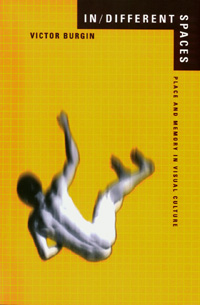 | Title: In/different spaces: place and memory in visual culture Author: Burgin, Victor Published: University of California Press, 1996 Subjects: Art | Art Criticism | Social Science Publisher's Description: Recent discussions about the culture of images have focused on issues of identity - sexual, racial, national - and the boundaries that define subjectivity. In this context Victor Burgin adopts an original critical strategy. He understands images less in traditional terms of the specific institutions that produce them, such as cinema, photography, advertising, and television, and more as hybrid mental constructs composed of fragments derived from the heterogeneous sources that together constitute the "media." Through deft analyses of a photograph by Helmut Newton, Parisian cityscapes, the space of the department store, a film by Ousmane Sembéne, and the writings of Henri Lefebvre, Andrè Breton, and Roland Barthes, Burgin develops an incisive theory of our culture of images and spectacle. In/Different Spaces explores the construction of identities in the psychical space between perception and consciousness, drawing upon psychoanalytic theories to describe the constitution and maintenance of "self" and "us" - in imaginary spatial and temporal relations to "other" and "them" - through the all-important relay of images. For Burgin, the image is never a transparent representation of the world but rather a principal player on the stage of history. [brief] Similar Items |
| 20. | 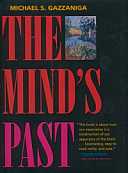 | Title: The mind's past Author: Gazzaniga, Michael S Published: University of California Press, 1998 Subjects: Science | Psychology | Cognitive Science | Neuroscience Publisher's Description: Why does the human brain insist on interpreting the world and constructing a narrative? In this ground-breaking work, Michael S. Gazzaniga, one of the world's foremost cognitive neuroscientists, shows how our mind and brain accomplish the amazing feat of constructing our past - a process clearly fraught with errors of perception, memory, and judgment. By showing that the specific systems built into our brain do their work automatically and largely outside of our conscious awareness, Gazzaniga calls into question our everyday notions of self and reality. The implications of his ideas reach deeply into the nature of perception and memory, the profundity of human instinct, and the ways we construct who we are and how we fit into the world around us.Over the past thirty years, the mind sciences have developed a picture not only of how our brains are built but also of what they were built to do. The emerging picture is wonderfully clear and pointed, underlining William James's notion that humans have far more instincts than other animals. Every baby is born with circuits that compute information enabling it to function in the physical world. Even what helps us to establish our understanding of social relations may have grown out of perceptual laws delivered to an infant's brain. Indeed, the ability to transmit culture - an act that is only part of the human repertoire - may stem from our many automatic and unique perceptual-motor processes that give rise to mental capacities such as belief and culture.Gazzaniga explains how the mind interprets data the brain has already processed, making "us" the last to know. He shows how what "we" see is frequently an illusion and not at all what our brain is perceiving. False memories become a part of our experience; autobiography is fiction. In exploring how the brain enables the mind, Gazzaniga points us toward one of the greatest mysteries of human evolution: how we become who we are. [brief] Similar Items |